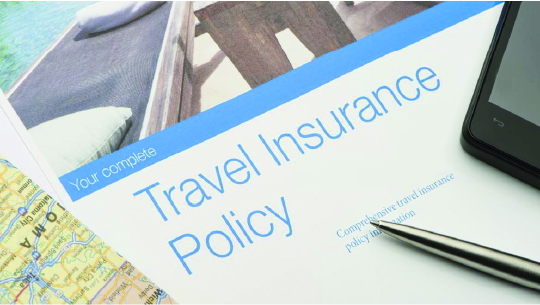A vacation adds to your life experiences, allows you to bond with friends and family, and improves your mental health. If you’re like the majority of Canadians, you can spend thousands of dollars on a vacation when you factor in flights, hotels, car rentals, meals, souvenirs and incidentals. On average, a couple can expect to spend up to $5,000 for a weeklong vacation. The point is that a vacation is an investment. And as with any other investment, it’s important to protect your money. Travel insurance protects your vacation investment from a variety of unforeseen events that may disrupt your plans. It costs just a fraction of your total trip and can help you recoup the money you’ve spent in the event that things don’t go as planned.
From your driveway to your destination and home again, travel insurance protects you. Here are some of the top reasons to consider getting travel insurance.
1. Trips get canceled — a lot
Most travel is paid for well in advance, typically months before you start to pack your suitcase. But life is unpredictable. Your situation can change due to a financial setback, unexpected family death or illness, unforeseen natural disaster or even a legal obligation such as being called for jury duty. Typically, any time you need to cancel a flight or hotel, you stand to lose a large portion of your investment. You may even lose all of the money you put toward your vacation. This could total thousands of dollars — money you probably can’t afford to lose. Fortunately, travel insurance policies offer trip cancellation and interruption coverage, and sometimes even “cancel for any reason” coverage, to help protect you. Depending on the type of policy and the coverage you’ve purchased, you may be able to recover up to 100% of your insured trip costs.
2. Medical emergencies happen at home and abroad
It’s not unusual to get sick when you travel, whether in Canada or abroad. Sometimes travel means less sleep, more exotic foods, questionable drinking water or heightened risk of infectious illnesses. You may also be more likely to get injured on vacation than you are when you’re sitting at your work desk, especially if you participate in adventurous activities such as zip lining, kayaking or hiking. Even driving on the other side of the road could raise your accident risk. You probably won’t have to spend a dime on medical care if you are just traveling to another province, thanks to the Interprovincial Billing Agreement. All provinces except Quebec have signed this bill, which covers any medically necessary procedure. Emergencies can happen while traveling abroad and provincial health care plans may not cover the full amount of care you will need. Additional services such as ambulance, repatriation and hospital transfers are also not covered. Emergency medical coverage can help fill any medical coverage gaps. Medical evacuation insurance coverage may be a good idea if you are traveling to a remote area. It covers the cost of being airlifted or transported to medical treatment in a different location. If you plan to be away from home for six months or more, travel medical plans can cover routine medical visits and prescription medication refills.
3. Natural disasters are unpredictable
Mother Nature has her own unpredictable plans. A hurricane can disrupt or cancel your Caribbean getaway. Your trip to Japan could be shaken up by an earthquake. Snow in Chicago could ground your flight, even if you have no plans to travel to (or through) the Windy City. Travel insurance can cover you in all these instances, whether you have to cancel your trip entirely or your flights are canceled. If you miss a connecting flight because of a weather delay, missed connection coverage can also protect you from monetary loss. In addition to trip cancellation coverage, you can purchase travel interruption coverage. Travel interruption insurance will help you return home if something occurs in the middle of your trip, whether it’s a medical issue or a natural disaster. Together, these policies cover the loss of money from the remainder of your trip, as well as the steep costs of getting a last-minute flight home.
4. Replacing lost luggage is expensive
Millions of bags are lost, damaged, delayed, or stolen every year. And no one wants to end up at their destination with just the clothes on their back. Even if you lose your baggage on your return trip home, it can be expensive to replace items in your suitcase. Lost or delayed baggage coverage can help cover these losses. If your baggage is delayed, it can cover the cost of purchasing necessary items while waiting for your bags. It can also include the cost of repairing any damaged items. If you plan to bring expensive or valuable items with you or plan to bring them home, you should insure your luggage to protect your investment.
5. You never know what might happen
All of the situations mentioned above happen fairly frequently. But travel insurance can help even when rare or unusual circumstances disrupt your vacation.
- Terrorism travel insurance covers you if your destination experiences a terrorist attack before or during your trip.
- Some travel insurance plans will cover you if the airline, hotel, or travel company you booked through goes bankrupt. If you find yourself with tickets for a flight that will never take off, you won’t lose out on the money you invested.
- Lost passport coverage helps you with the fees and difficulties of replacing or traveling without a passport abroad. It can also help if you have to rebook flights because of a delay due to a lost passport.
For almost any reason that your trip may be canceled, delayed, or interrupted, there’s a travel insurance policy that can help you get all or a portion of your money back.
How to buy travel insurance
Talk to your insurance broker to find the right type and level of travel insurance for your specific trip. No matter what life throws your way, you’ll have the resources you need — and less worry about unexpected out-of-pocket costs.
Please note: This content is for informational purposes only and not for the purpose of providing, financial, medical or legal advice. You should contact your attorney, doctor, broker or advisor to obtain advice with respect to any particular issue or problem.
Copyright © 2023 Applied Systems Inc. All rights reserved.



